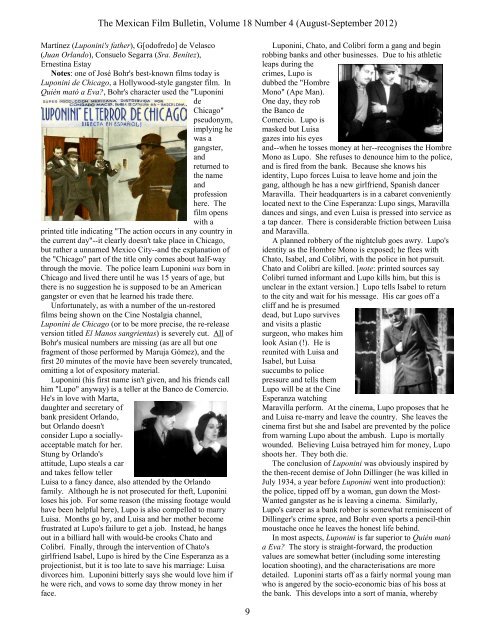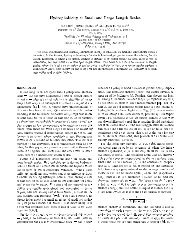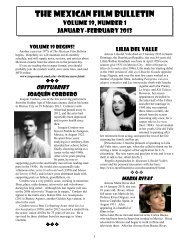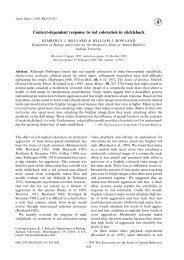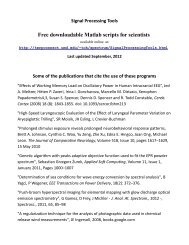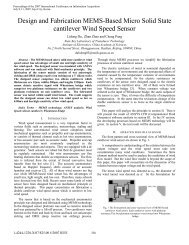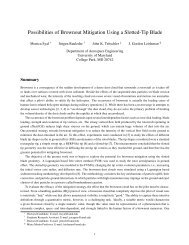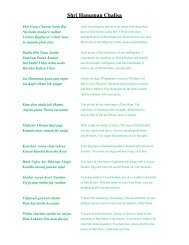Bonus Jorge Luke Film Review - TerpConnect
Bonus Jorge Luke Film Review - TerpConnect
Bonus Jorge Luke Film Review - TerpConnect
Create successful ePaper yourself
Turn your PDF publications into a flip-book with our unique Google optimized e-Paper software.
The Mexican <strong>Film</strong> Bulletin, Volume 18 Number 4 (August-September 2012)<br />
Martínez (Luponini's father), G[odofredo] de Velasco<br />
(Juan Orlando), Consuelo Segarra (Sra. Benítez),<br />
Ernestina Estay<br />
Notes: one of José Bohr's best-known films today is<br />
Luponini de Chicago, a Hollywood-style gangster film. In<br />
Quién mató a Eva?, Bohr's character used the "Luponini<br />
de<br />
Chicago"<br />
pseudonym,<br />
implying he<br />
was a<br />
gangster,<br />
and<br />
returned to<br />
the name<br />
and<br />
profession<br />
here. The<br />
film opens<br />
with a<br />
printed title indicating "The action occurs in any country in<br />
the current day"--it clearly doesn't take place in Chicago,<br />
but rather a unnamed Mexico City--and the explanation of<br />
the "Chicago" part of the title only comes about half-way<br />
through the movie. The police learn Luponini was born in<br />
Chicago and lived there until he was 15 years of age, but<br />
there is no suggestion he is supposed to be an American<br />
gangster or even that he learned his trade there.<br />
Unfortunately, as with a number of the un-restored<br />
films being shown on the Cine Nostalgia channel,<br />
Luponini de Chicago (or to be more precise, the re-release<br />
version titled El Manos sangrientas) is severely cut. All of<br />
Bohr's musical numbers are missing (as are all but one<br />
fragment of those performed by Maruja Gómez), and the<br />
first 20 minutes of the movie have been severely truncated,<br />
omitting a lot of expository material.<br />
Luponini (his first name isn't given, and his friends call<br />
him "Lupo" anyway) is a teller at the Banco de Comercio.<br />
He's in love with Marta,<br />
daughter and secretary of<br />
bank president Orlando,<br />
but Orlando doesn't<br />
consider Lupo a sociallyacceptable<br />
match for her.<br />
Stung by Orlando's<br />
attitude, Lupo steals a car<br />
and takes fellow teller<br />
Luisa to a fancy dance, also attended by the Orlando<br />
family. Although he is not prosecuted for theft, Luponini<br />
loses his job. For some reason (the missing footage would<br />
have been helpful here), Lupo is also compelled to marry<br />
Luisa. Months go by, and Luisa and her mother become<br />
frustrated at Lupo's failure to get a job. Instead, he hangs<br />
out in a billiard hall with would-be crooks Chato and<br />
Colibrí. Finally, through the intervention of Chato's<br />
girlfriend Isabel, Lupo is hired by the Cine Esperanza as a<br />
projectionist, but it is too late to save his marriage: Luisa<br />
divorces him. Luponini bitterly says she would love him if<br />
he were rich, and vows to some day throw money in her<br />
face.<br />
9<br />
Luponini, Chato, and Colibrí form a gang and begin<br />
robbing banks and other businesses. Due to his athletic<br />
leaps during the<br />
crimes, Lupo is<br />
dubbed the "Hombre<br />
Mono" (Ape Man).<br />
One day, they rob<br />
the Banco de<br />
Comercio. Lupo is<br />
masked but Luisa<br />
gazes into his eyes<br />
and--when he tosses money at her--recognises the Hombre<br />
Mono as Lupo. She refuses to denounce him to the police,<br />
and is fired from the bank. Because she knows his<br />
identity, Lupo forces Luisa to leave home and join the<br />
gang, although he has a new girlfriend, Spanish dancer<br />
Maravilla. Their headquarters is in a cabaret conveniently<br />
located next to the Cine Esperanza: Lupo sings, Maravilla<br />
dances and sings, and even Luisa is pressed into service as<br />
a tap dancer. There is considerable friction between Luisa<br />
and Maravilla.<br />
A planned robbery of the nightclub goes awry. Lupo's<br />
identity as the Hombre Mono is exposed; he flees with<br />
Chato, Isabel, and Colibrí, with the police in hot pursuit.<br />
Chato and Colibrí are killed. [note: printed sources say<br />
Colibrí turned informant and Lupo kills him, but this is<br />
unclear in the extant version.] Lupo tells Isabel to return<br />
to the city and wait for his message. His car goes off a<br />
cliff and he is presumed<br />
dead, but Lupo survives<br />
and visits a plastic<br />
surgeon, who makes him<br />
look Asian (!). He is<br />
reunited with Luisa and<br />
Isabel, but Luisa<br />
succumbs to police<br />
pressure and tells them<br />
Lupo will be at the Cine<br />
Esperanza watching<br />
Maravilla perform. At the cinema, Lupo proposes that he<br />
and Luisa re-marry and leave the country. She leaves the<br />
cinema first but she and Isabel are prevented by the police<br />
from warning Lupo about the ambush. Lupo is mortally<br />
wounded. Believing Luisa betrayed him for money, Lupo<br />
shoots her. They both die.<br />
The conclusion of Luponini was obviously inspired by<br />
the then-recent demise of John Dillinger (he was killed in<br />
July 1934, a year before Luponini went into production):<br />
the police, tipped off by a woman, gun down the Most-<br />
Wanted gangster as he is leaving a cinema. Similarly,<br />
Lupo's career as a bank robber is somewhat reminiscent of<br />
Dillinger's crime spree, and Bohr even sports a pencil-thin<br />
moustache once he leaves the honest life behind.<br />
In most aspects, Luponini is far superior to Quién mató<br />
a Eva? The story is straight-forward, the production<br />
values are somewhat better (including some interesting<br />
location shooting), and the characterisations are more<br />
detailed. Luponini starts off as a fairly normal young man<br />
who is angered by the socio-economic bias of his boss at<br />
the bank. This develops into a sort of mania, whereby


